イノベーショントレンド
【素材・化学特集】スタートアップにとって設備投資の負担は大。成長戦略を歩むには、複数の大企業との連携が不可欠となる
\イノベーショントレンド解説/
この連載ではモーニングピッチ各回で取り上げたテーマと登壇ベンチャーを紹介し、日本のイノベーションに資する情報を発信します。
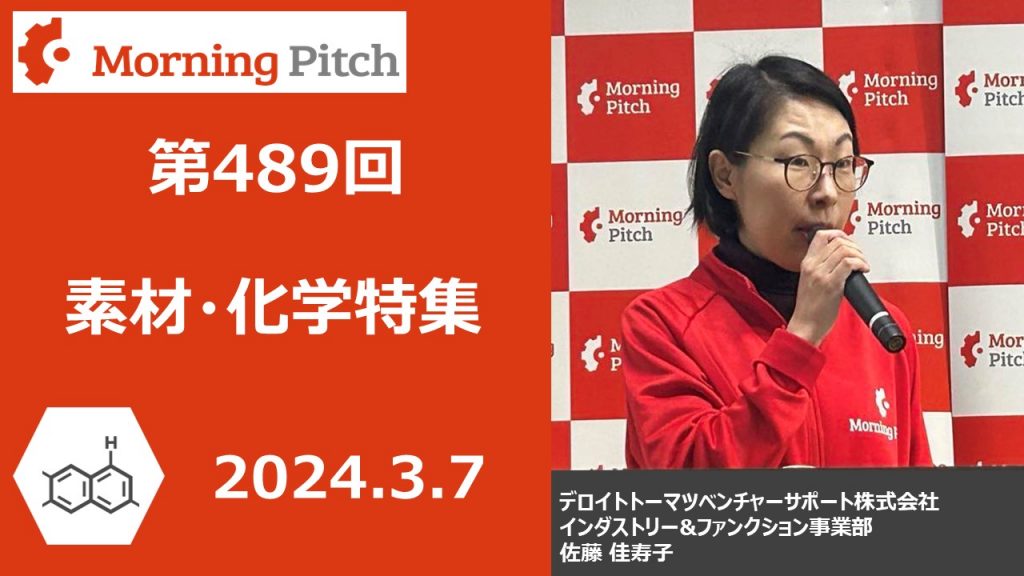
今回は、3月7日に開催した素材・化学特集です。
世界の化学メーカー上位50社の合計売上高は順調に推移
初めに「素材・化学産業とは何か」について説明します。原油、鉱物、植物といった原材料から基礎化学品、中間体・誘導体を経て衣・食・住に必要な基本的資材を提供しているのが素材・化学産業です。例えば身近なものですと食料・農業の分野では食品添加物や農薬、日用品においては繊維や洗剤など。私たちの生活において欠かすことのできない製品の源であり、多岐にわたる産業に関わっています。
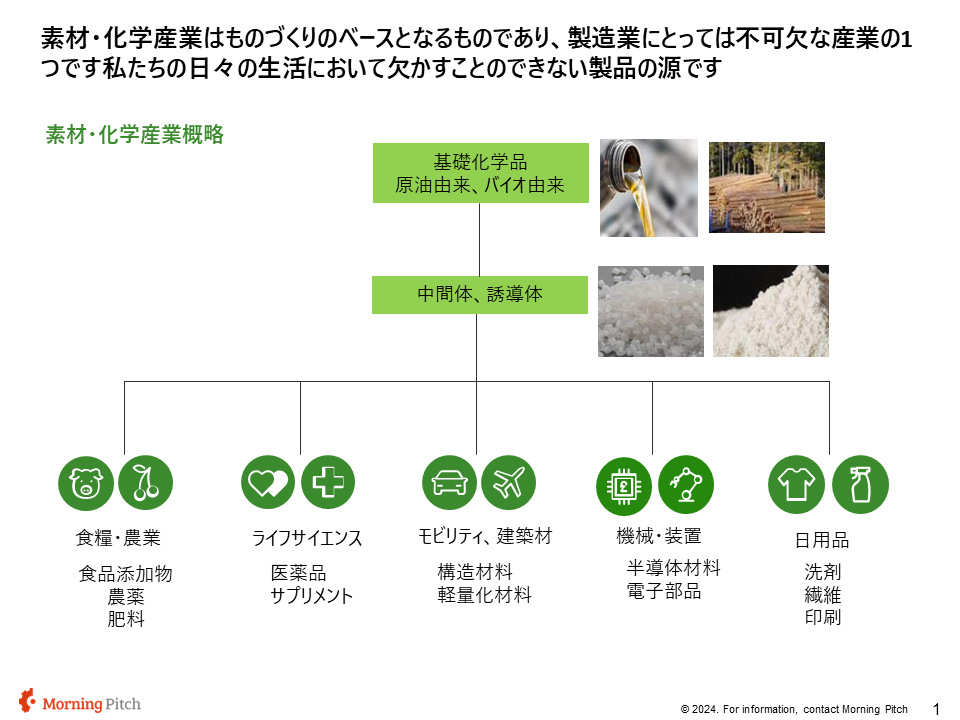
今回は、世界の化学メーカー上位50社の売上高の推移について紹介します。原油価格の高騰やコロナ禍の影響によって、いったんは全体の売上高が低下したものの、2020年以降は順調に伸びており、2022年の合計売上高は1.2兆㌦となりました。直近5年間の年間平均成長率は6.6%。今後もさらなる成長が期待できる産業です。
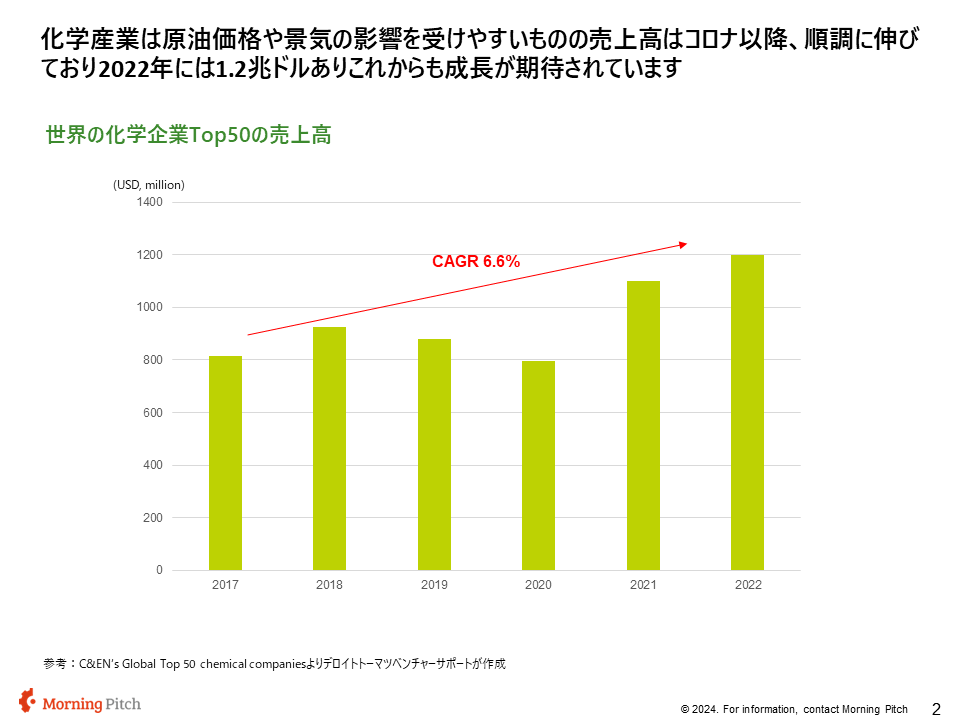
日本の素材・化学産業は国内総生産(GDP)に占める割合が20%以上あり、非常に重要な産業であることが分かります。世界の産業における日本の化学製品のポジショニングを見ると、半導体材料や有機EL材料などの機能性化学品は、高いシェアを占めていることが分かります。
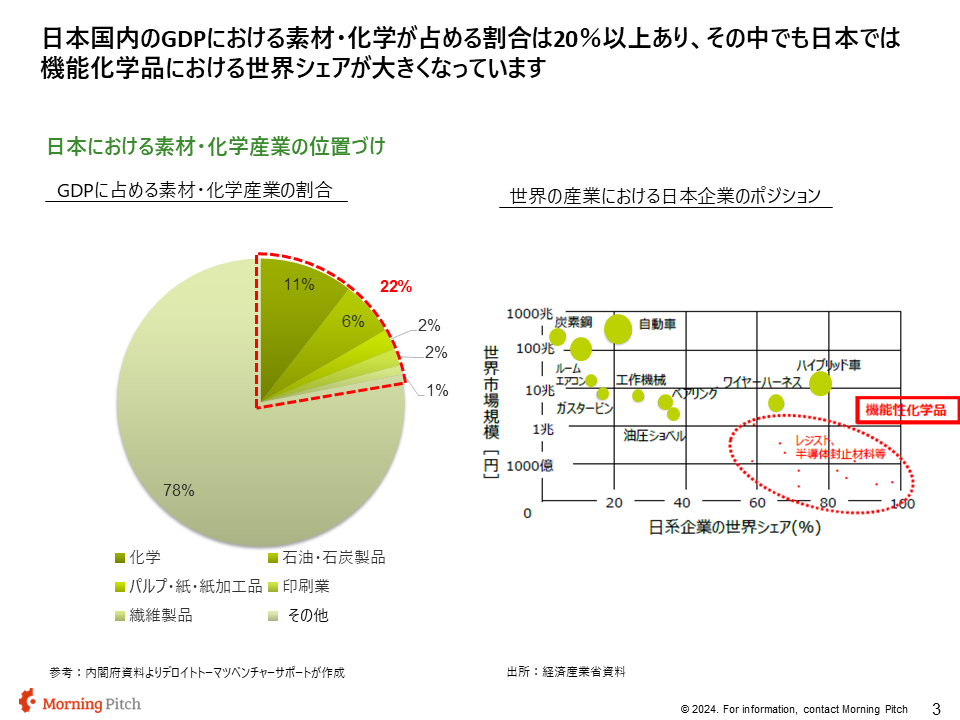
量産化に至るまでの時間は平均で10年以上
機能性化学品分野で強い競争力を維持している日本の化学産業ですが、一方では「製品化されるまでに時間がかかる」「設備投資額が大きくなる」といった課題を抱えています。量産化に至るまでの時間は平均すると10年以上。設備投資額は最終的に数十億から数百億円にもなります。スタートアップにとって素材・化学業界で台頭するには資金の負担感が大きいだけに、複数企業との協業によって成長戦略を歩む動きが活発化しています。
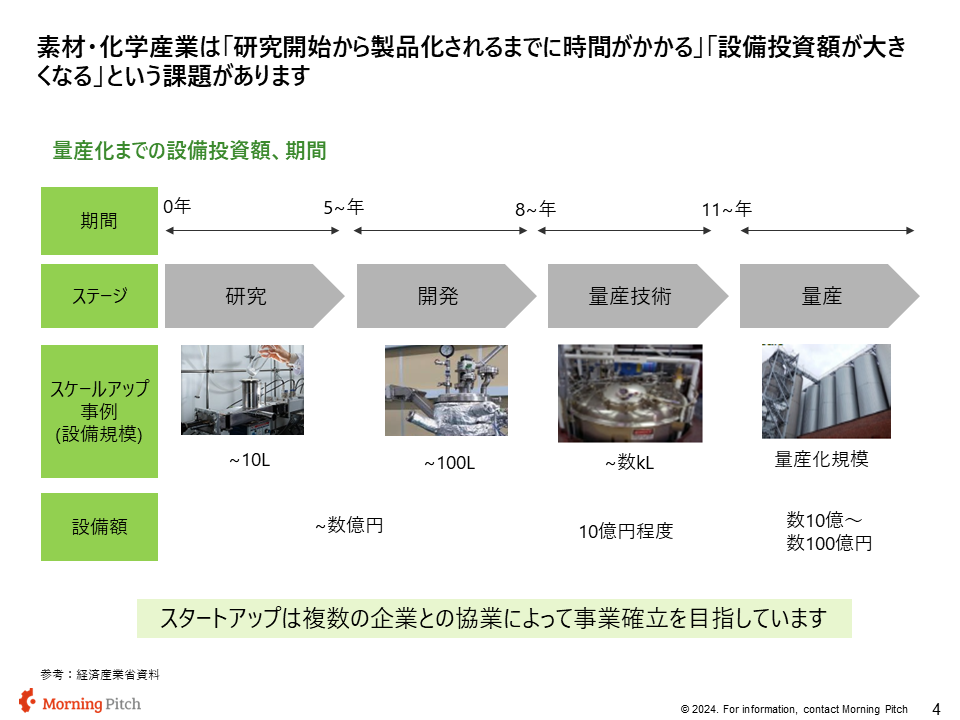
大手化学メーカーとの協業により事業を拡大し、IPOを果たしたスタートアップの事例を紹介します。電子レンジで用いられている電磁波を用いたプロセス開発を行う企業は、制御が難しく、産業用途としてのハードルが高いという電磁波の特性を克服。複数の大手企業とのプロジェクトおよびジョイントベンチャーの設立などを通じ事業を拡大しました。
非可食バイオマスを用いた化粧品
一般的にバイオマスとして用いられるのはトウモロコシやサトウキビといった可食材料ですが、バイオマスを原料とする化学品の開発を行うスタートアップは、非可食原料を活用して化粧品メーカーと共同プロジェクトを進めています。具体的にはポプラのウッドチップを原料とした新しい発酵エタノールの開発に成功。環境に配慮した化粧品原料として実用化しています。こうしたプロジェクトを実施することで事業を拡大し、IPOを果たしました。
以上のように素材・化学企業にとって生産したものを利用する顧客の皆様だけではなく、生産技術の構築に協力をする企業の存在が非常に重要となっています。
今回は基礎化学品、中間体、ソリューション、モビリティ・建築材、日用品という領域から5社を紹介します。
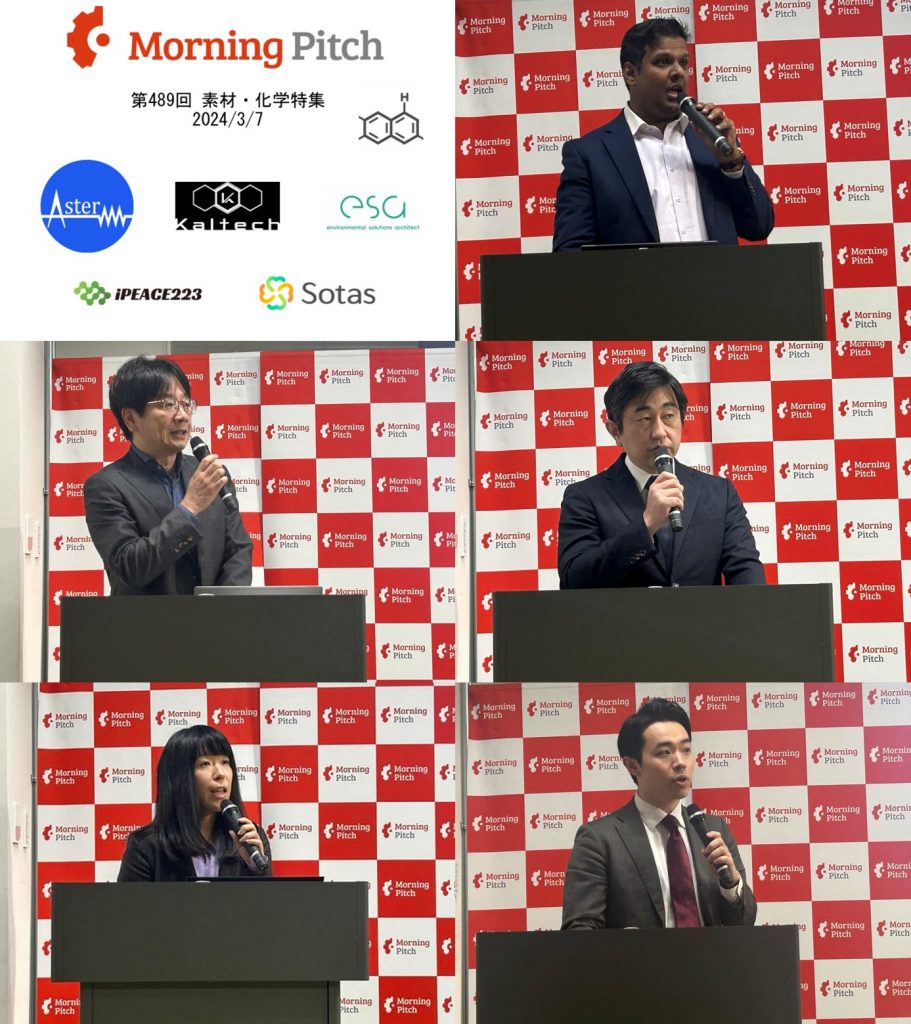
塗るだけで阪神淡路大震災相当の揺れに耐えられる耐震補強材(株式会社Aster)
Aster(アスター)は塗るだけで耐震補強できる、グラスファイバー入りの水性塗料を提供しています。通常の塗料のように上から厚さ1㍉程度の量を塗るだけで石やレンガ積みの壁を丈夫にし、国際協力機構(JICA)の実験では、阪神淡路大震災相当の揺れに耐えられることが分かっています。また、数値解析と地震工学の知識を組み合わせることで、構造上のリスクを理解することができます。現在はフィリピンと台湾で事業を進めていますが、今後は地震が多発する地域へ展開していく予定です。
光触媒技術で空気の浄化や食品ロス対策(Kaltech Corporation)
Kaltech(カルテック)Corporationは、光触媒技術を活用した有機物分解で、空気の浄化や食品ロス対策を実現しています。例えば食パンの保存実験では、光触媒モジュールを同じ容器に入れると3週間後もカビが生えないという結果が出ています。ミカン倉庫での実証結果でも鮮度保持を実現。食品ロスの解決に貢献できる可能性があります。こうした実績が評価され病院・介護施設や飲食店から一般家庭に至るまで、約5万カ所に導入されています。今後はメーカーと協業してモジュールを開発、空気清浄機や冷蔵庫に提供していきます。
複層プラスチックをリサイクルした新素材(株式会社esa)
esa(イーサ)は独自技術で複層プラスチックをリサイクルした新素材「Repla(リプラ)」を提供しています。量産機による1時間あたり500~700㌔という高い処理能力をはじめ、高付加価値化を実現。すでにシモジマと共同で、Replaを原料としたビニール袋を開発しているほか、車いすメーカーの部材の一部にも採用が決まっています。今後は、モデル工場の本稼働に向けて増産した後、産廃業者などとライセンスビジネスを確立し、Replaの製造工場を全国へ増やしていきます。長期的には海外進出も目指しています。
製造時に6~7割ものCO2排出量を削減できるプロピレン(iPEACE223株式会社)
iPEACE223(アイピーストゥートゥースリー)はバイオエタノールを原料としたグリーンプロピレンの製造技術を保有しています。基礎化学品の1つであるプロピレンは多くの化学産業に利用されており、石化資源由来のため製造時に多くのCO2を排出します。これに対しiPEACE223の技術では、ゼオライト触媒を用いることで既存の反応よりも低温かつ常圧でプロピレンを製造。従来法に比べると6~7割ものCO2排出量を削減でき、グリーンLPガス市場への参入を目指します。
業務効率を飛躍的に向上する素材データプラットフォーム(Sotas株式会社)
Sotas(ソータス)は化学品を取り扱う企業の業務効率を飛躍的に向上する素材データプラットフォームを提供します。環境配慮型の生産在庫管理・受発注システムに加えデータベース、調査システムという3つのプラットフォームを持ち、使いやすいUIとサービス間の連携が特徴です。今後は、大手化学メーカーへの導入や商社・銀行とのアライアンスを通して、サービスを拡大します。化学業界は有力なデジタルサービスがないため、素材データプラットフォームを通じ業界のDXを進めていきます。
国内の業界別で見ると、化学産業が排出するCO2の量は鉄鋼業に次いで第2位です。温暖化ガスの排出量を実質ゼロにするカーボンニュートラルを目指すには、化石資源に依存しない取り組みを進めるとともにバイオマスやリサイクル素材の積極的な活用が重要です。脱炭素をめぐるグローバル競争が激しさを増しており、日本が競争で優位に立つには、大企業との連携の加速による、素材・化学系スタートアップのさらなる台頭が不可欠と言えるでしょう。
▼テーマリーダーProfile

デロイト トーマツ ベンチャーサポート株式会社
インダストリー&ファンクション事業部
佐藤 佳寿子(さとう かずこ)
大学院卒業後、日系メーカーにて研究開発、及び事業開発を経験。その後、素材・化学系のベンチャーキャピタル、インハウスシンクタンクを経て、培養肉スタートアップで事業開発・大企業連携等に従事。現職では、ディープテック領域を中心に大企業での新規事業創出支援・イノベーションエコシステム構築等のプロジェクトに関わる。
~イノベーショントレンドを定期的にキャッチアップされたい方へ~
—————————————————————————————————————————————-
Morning Pitchでは、上記のような各回テーマ概観の解説を
資料や動画にして有料会員様限定でお届けしています
解説資料・・・Morning Pitch有料会員
解説動画・・・Morning Pitch Innovation Community(MPIC)会員
—————————————————————————————————————————————-




